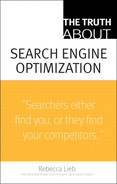Just because you are number one in search engine results today, doesn’t mean you will be number one tomorrow. Search rankings don’t just rise and fall because of the routine tweaks and updates major search engines are constantly making to their algorithms and indices. They fluctuate because the nature of search is changing as search engines extend their reach for what many consider to be the brass ring in the search engine’s game: searcher intent.
For example, let say someone searches for “123 Main Street, Mytown, USA 12345”. A couple of years ago, the top result on Google would probably have been a business at that address. Today, the top result for an address search is likely to be a graphic: a Google map with that particular location starred.
Search for “beatles sgt pepper,” and Google guesses you’re looking to buy the album. The top results link to the product on Amazon, Circuit City, and CD Universe. Searching for “indiana jones” produces a link to a video trailer for the most recent film in the series, “Indiana Jones and the Kingdom of the Crystal Skull,” together with a box in which a searcher can input his or her zip code for local theaters and show times. Current topics in the news, such as “george w bush” or “global warming” deliver news stories as the top results, accompanied by photographs.
Welcome to universal search, in which combinations of vertical search results, together with news, local, video, and image results, are beginning to appear at the top of the page by default. This effort by search engines to anticipate and meet searcher intent (for example, if I’m searching for a film, it’s because I want to see it; if I’m searching for an address, it’s because I want to find the location) is one of the many ways search is irrevocably changing.
Inevitably, universal search is changing search engine optimization, too. Optimizing a site, or the bits and pieces of content and media on a web property, now has different and shifting implications. First and foremost, it’s more important than ever to pay attention to optimizing media files such as video, graphics, and photos. It’s now wholly possible that videos, graphics, and photos might appear in the top results in lieu of a link to an actual website.
Universal search also means being number one isn’t what it used to be. Yours might be the top-ranked website when search results show up for a given query, but the top-ranked site no longer necessarily appears in that coveted number-one position in search results. Moreover, because that top result (or set of results) may occupy a large swath of search result real estate (such as a map, a photo, or an image), the top-ranked site is further down the page. Results that formerly appeared on page one in lower-ranked positions can be pushed to the second or third page of search results, making them less evident to searchers.
Search algorithms aren’t the only thing changing. The entire nature of search is in a state of constant upheaval and evolution.
Personalized search results also affect rankings, as well as what results you might get if you replicated the searches I did previously. The engines have long offered users the option to personalize results to some extent. For example, some search engines offer the ability to filter out adult content or to only deliver results in the English language.
Say you live in Portland, Maine, and I live in Portland, Oregon. If we both have accounts on Google, MSN, or Yahoo! (e-mail, personalized home pages, maps, photo sharing, document creation and editing—the palette is ever-broadening), we’re giving those companies and their search engines the opportunity to learn a lot about us based on our habits, history, and personal (but, it’s important to point out, non-personally identifiable) data. So hypothetically, when we both search for the same products and services, your results will be skewed toward businesses in Maine, while mine will land squarely in Oregon. You’re a musician; I’m into fishing. So your search for “bass” shows results heavier on musical instruments, whereas my search reveals options for fishing trips, rods and reels, and maybe even seafood recipes.
Your kiwi is a fruit. Mine is a friend from New Zealand where natives are referred to as “kiwis.”
Otherwise put, your number-one search result might not even show up in my search results.
Clicking on search result options such as “Similar pages” and “Note this” on Google provide even more personalized results, immediately as well as for similar searches in the future, presumably.
At present, Google is delivering personalized search results to logged-in users, and will likely intensify and refine their efforts in this direction in the future. Yahoo! and Ask are said to be collecting the data that can enable this functionality, but aren’t yet serving up personalized results. Given that Google is the 900-pound gorilla of search, personalized search, as well as universal search, matters—a lot.
Personalized and universal search affect SEO, and will only have a bigger impact in the future. Optimization is rapidly becoming more customized and less of a one-size-fits-all-website solution. Optimizing sites, and site elements for search, will likely become more difficult, but the rewards are potentially greater.
Search engines are becoming ever-better at assessing user intent. The fundamental goals of optimization will not change—getting relevant results in front of the searchers who are raising their hands via search, signaling their intent to find web content that addresses their immediate needs.
Universal and personalized search make the SEO game more complex. Not to be forgotten, however, is that universal and personalized search make SEO more rewarding both to searchers and to site owners.
